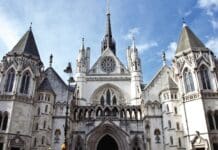Prime Minister Boris Johnson has said “capitalism” and “greed” are behind the success of the UK’s vaccine programme, according to reports.
After striking a sombre tone at his Downing Street news conference to mark a year since the first lockdown, Mr Johnson then joked with Tory colleagues at a meeting of the backbench 1922 Committee.
“The reason we have the vaccine success is because of capitalism, because of greed my friends,” he told MPs on a Zoom call, The Sun reported.
But as he risked inflaming tensions with the EU amid its slow jab rollout, he backtracked, adding: “Actually I regret saying it. Forget I said that.”
A Downing Street spokesman declined to comment on what had happened during the meeting, but there was no denial of the prime minister’s reported comments.
Defending the prime minister, one MP who heard the comments told Sky News the remarks were a “complete joke” and Mr Johnson was talking about AstraZeneca “being philanthropic in non-profit production”.
“It’s pretty cheap to distort the meaning for political gain,” they added.
The controversy comes as Mr Johnson faces a tough end-of-term interrogation on coronavirus following his claims the UK is making progress a year after his first lockdown.
As well as his last Prime Minister’s Questions clash with Sir Keir Starmer for three weeks, he is facing questions from MPs who chair all-party select committees.
His double grilling comes on the eve of a potentially large Tory rebellion in a Commons vote on lockdown restrictions on the final day before parliament’s Easter recess.
After PMQs, the prime minister faces a long session in front of the Liaison Committee on his COVID-19 response, as well as questions on the UK’s place in the world and the economy.
At the Liaison Committee meeting, leading the MPs’ onslaught on COVID will be:
• Yvette Cooper, Labour chair of the Home Affairs Committee, who has been a fierce critic of government policy on border controls and coronavirus quarantine measures;
• Meg Hiller, Labour chair of the Public Accounts Committee, a critic of test and trace failings and poor value for money on COVID contracts;
• Jeremy Hunt, former health secretary who chairs the Health and Social Care Committee, who at times has criticised the PM’s lockdown strategy;
• William Wragg, who chairs the Constitutional Affairs Committee and has been at the forefront of demands for a COVID public inquiry;
• Stephen Crabb, who chairs the Welsh Affairs Committee, who has called for more help for people from low-income households during the pandemic.
This is Mr Johnson’s third appearance before the Liaison Committee – chaired by a Brexiteer ally, Tory MP Sir Bernard Jenkin – since he became prime minister.
At his last appearance, on 13 January this year, Mr Johnson clashed with Ms Cooper over border controls and also spoke of his concern about a new Brazilian variant of COVID-19.
MPs on the committee also questioned why new rules requiring all travellers to test negative before they enter the UK were being brought in 10 months after the pandemic began.
Asking why UK borders were not immediately shut to Brazil travellers after warnings of the new strain, Ms Cooper said: “Why aren’t you taking immediate action on a precautionary basis?”
And she added: “You give the impression each time that you just delay all of the difficult and uncomfortable decisions until the last possible minute and when so many lives are at stake, prime minister, is this the leadership we really need?”
In reply, Mr Johnson rejected Ms Cooper’s claims and said huge quantities of checks were being carried out to see if people were self-isolating.
The interrogations follow an emotional day on Tuesday that marked the first anniversary of the first lockdown, on which the nation fell silent to remember those who have died during the pandemic.
From the steps of 10 Downing Street, to Blackpool Tower and Bradford City Hall – and from market towns to small villages, the day was rounded off with light shows and candles for the victims.
And at a news conference in Downing Street to mark the anniversary, a tired-looking Mr Johnson – who almost died from COVID last year – spoke of his own emotions.
“I certainly think this is something we will all remember and be dealing with in different ways – for – certainly in my case – for as long as I live,” he told Beth Rigby of Sky News.
“It has been an extraordinary moment in our history and deeply difficult and distressing period.
Asked about lessons learned, he said: “In retrospect there are probably many things that we wish that we’d known and many things that we wish we’d done differently at the time, in retrospect, because we were fighting a novel disease under very different circumstances than any previous government had imagined.”
The prime minister promised a memorial to those who have died in the pandemic and said the nation was “step by step, jab by jab” on the path to “reclaiming our freedoms”.
Why Downing Street is scared about what Boris Johnson will say or do next
PLEASE SUPPORT US FOR JUST £2 A MONTH












